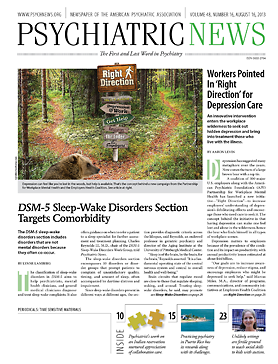The Food and Drug Administration (FDA) has approved new indications for the atypical antipsychotic medication lurasidone (Latuda; manufactured by Sunovion) in the treatment of patients with depressive episodes associated with bipolar I disorder. The approval covers use of the medication alone and in conjunction with lithium or valproate.
“Its utility as monotherapy and adjunctive therapy places the drug in a select position in an area with few other medication choices,” said Roger McIntyre, M.D., a professor of psychiatry and pharmacology at the University of Toronto, in an interview with Psychiatric News. Lurasidone is already approved for use in patients with schizophrenia.
Clinical trials indicated that the drug appeared to cause fewer metabolic problems or weight gain than other drugs in its class, said McIntyre, who formerly consulted with Sunovion's Canadian affiliate but does not do so now. “It's as close to weight-neutral as possible.”
The existing alternatives, quetiapine (Seroquel) and an olanzapine/fluoxetine combination (Symbyax), both induce weight gain, and the latter is also difficult to titrate, said McIntyre.
At APA's 2013 annual meeting in San Francisco in May, McIntyre called weight gain a “brain hazard,” because obesity in bipolar patients lessens chances for recovery from manic episodes and increases their risk for depression.
In two six-week clinical trials submitted to the FDA, lurasidone was tested over its complete daily dosing range of 20 mg to 120 mg, and average weight gain was 0.3 kg with monotherapy and 0.1 kg with adjunctive use, said psychiatrist Antony Loebel, M.D., chief medical officer at Sunovion. Trial results were presented in poster sessions at APA's 2012 annual meeting and have been submitted for publication.
The new indication should help fill an unmet need for more treatment options that clinicians can use in patients with bipolar depression, Loebel told Psychiatric News. There currently is a mismatch between symptoms and treatment choices, he said. “Most medications approved by the FDA for bipolar disorder address the manic stage. However, patients spend most of their time in the depressive phase and find it more distressing but have fewer options for treatment.”
The clinical trials recorded effects on body mass index, lipids, glucose, and insulin. The trials included patients with bipolar I disorder who had a history of depression and at least one manic episode, said Loebel.
As with other drugs in its class, the new indications come with black-box warnings noting that lurasidone is not approved for treating elderly patients with dementia-related psychosis. And as is the case with antidepressants, it also includes warnings that clinicians need to monitor patients closely for suicidality as treatment begins. Lurasidone is not approved for use in patients under age 18. ■
